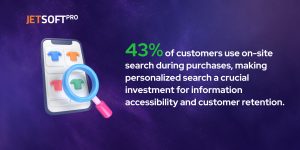E-commerce has emerged as a thriving industry, allowing businesses to reach a global customer base and maximize their growth potential. As the number of online shoppers continues to rise, startup e-commerce platforms face unique challenges in establishing their presence and gaining a competitive edge. One way for these startups to overcome these challenges is by leveraging custom software solutions tailored to their specific needs.
Custom software solutions refer to software applications developed specifically for a particular business or organization. Unlike off-the-shelf software, custom solutions are built from scratch, considering the unique requirements, goals, and workflows of the business. These solutions are designed to address specific pain points and provide tailored functionalities.
Startup e-commerce platforms are newly established online businesses aiming to carve a niche for themselves in the highly competitive e-commerce landscape. These platforms often face limitations in terms of resources, brand recognition, and infrastructure. However, they possess the potential for rapid growth and success if they can effectively leverage technological advancements and innovative strategies.
Custom software solutions play a crucial role in enabling startup e-commerce platforms to overcome their challenges and achieve their business objectives. By tailoring software applications to meet their specific needs, these startups can enhance flexibility and scalability, deliver personalized user experiences, streamline operations, ensure integration and compatibility, strengthen security and data protection, as well as achieve cost-effectiveness and a high return on investment. In the following sections, we will explore each of these benefits in detail, showcasing the significant advantages that custom software solutions offer to startup e-commerce platforms.
Enhanced Flexibility and Scalability
Flexibility and scalability are vital aspects of any successful e-commerce platform. Flexibility refers to the platform’s ability to adapt to changing business needs, market trends, and customer demands. It allows startups to quickly modify or add features, integrate new functionalities, and customize their platform as their business evolves. On the other hand, scalability refers to the platform’s capacity to handle increasing volumes of data, traffic, and transactions without compromising performance. It ensures that the platform can grow seamlessly as the business expands.
How do custom software solutions provide tailored flexibility?
Custom software solutions are specifically designed to offer flexibility and adaptability to startup e-commerce platforms. Unlike off-the-shelf software, which often comes with predefined features and limitations, custom solutions can be tailored to the unique requirements and workflows of the business. Developers work closely with the startup to understand their needs and create software that aligns perfectly with their vision and goals. This level of customization empowers startups to have full control over their platform’s functionality, user experience, and integrations, providing the flexibility to make changes as needed.
Custom software solutions offer a wide range of scalable features that enable startup e-commerce platforms to grow and handle increased demands. Here are a few examples:
- Robust infrastructure: Custom software allows startups to build a scalable infrastructure that can handle high traffic and accommodate a growing user base. It ensures that the platform remains stable and responsive, even during peak times.
- Modular architecture: Custom solutions can be developed using a modular architecture, where different components can be added or removed as needed. This modularity allows startups to scale their platform by integrating new functionalities or removing unnecessary ones, without disrupting the overall system.
- Elastic computing resources: Custom software can leverage cloud computing technologies to provide elastic resources. This means that startups can scale up or down their computing resources based on demand, ensuring optimal performance and cost efficiency.
- Multi-channel support: As e-commerce platforms expand, they often need to cater to multiple sales channels, such as websites, mobile apps, social media platforms, and marketplaces. Custom software can provide seamless integration and management of these channels, allowing startups to reach a wider audience and handle diverse sales channels effectively.
- Scalable databases: Custom solutions can incorporate scalable database architectures, such as sharding or partitioning, to handle large amounts of data efficiently. This ensures that the platform can accommodate increasing product catalogs, customer databases, and transactional data without performance degradation.
By leveraging these scalable features, custom software solutions empower startup e-commerce platforms to grow and adapt to changing market dynamics while maintaining optimal performance and user experience.
Personalized User Experience
In the highly competitive world of e-commerce, providing a superior user experience is crucial for the success of startup platforms. User experience encompasses every interaction a customer has with a platform, from browsing products to making a purchase and receiving support. A seamless and personalized user experience can significantly impact customer satisfaction, loyalty, and ultimately, business growth. Customers expect tailored recommendations, intuitive navigation, quick-loading pages, and personalized communication to enhance their shopping journey.
How do custom software solutions allow for personalized user experiences?
Custom software solutions enable startup e-commerce platforms to deliver personalized user experiences that cater to individual customer preferences and needs. Unlike generic software, custom solutions can be designed to capture and analyze customer data, allowing businesses to understand their customers better. This data can be used to personalize the shopping experience by offering product recommendations, targeted promotions, and tailored content.
By leveraging custom software, startups can implement sophisticated algorithms and machine learning techniques to track customer behavior, preferences, and purchase history. This data-driven approach allows for real-time personalization, ensuring that customers are presented with relevant products, personalized offers, and a seamless shopping journey.
Here are some examples of personalized features in custom software solutions
- Personalized product recommendations: Custom software solutions can analyze customer data, such as browsing history, purchase patterns, and preferences, to generate personalized product recommendations. These recommendations can be displayed on the homepage, product pages, or through email marketing, enhancing the chances of cross-selling and upselling. Statistics reveal that over 60% of consumers exhibit a higher propensity to become repeat buyers when a company offers them a personalized shopping experience.
- Customizable user interfaces: With custom software, startups have the freedom to design user interfaces that align with their brand identity and provide a personalized experience. Customizable interfaces allow businesses to create intuitive navigation, personalized dashboards, and tailored layouts, enhancing user engagement and satisfaction.

- Dynamic pricing and offers: Custom software solutions can implement dynamic pricing strategies based on customer segmentation, browsing behavior, and purchase history. Startups can offer personalized discounts, loyalty rewards, or exclusive promotions to individual customers, creating a sense of personalization and value.
- Intelligent search and filtering: Custom software can incorporate advanced search and filtering capabilities that enable users to find products quickly and easily. Startups can implement features like predictive search, personalized filtering options, and smart product categorization, resulting in a more efficient and personalized shopping experience.
- Tailored communication and notifications: Custom software allows for personalized communication with customers through targeted emails, push notifications, and in-app messaging. Startups can send personalized order updates, abandoned cart reminders, and relevant promotions based on individual customer preferences and behavior.
By leveraging these personalized features, custom software solutions empower startup e-commerce platforms to provide unique and tailored experiences to their customers. This level of personalization enhances customer satisfaction, drives engagement, and fosters long-term customer loyalty, ultimately leading to business growth and success in the competitive e-commerce landscape.
Streamlined Operations and Efficiency
Startup e-commerce platforms often encounter numerous challenges when it comes to streamlining their operations and achieving optimal efficiency. These challenges include:
- Manual processes: Limited resources and time constraints may lead to manual and repetitive tasks, such as order processing, inventory management, and customer support. These manual processes can be time-consuming, error-prone, and hinder scalability.
- Lack of integration: Disparate systems and software solutions that don’t communicate with each other can result in data silos and inefficient workflows. This lack of integration can lead to duplication of efforts, data inconsistencies, and hindered decision-making processes.
- Inefficient inventory management: Poor inventory management can lead to stockouts, overstocking, and delays in fulfilling customer orders. Without streamlined inventory processes, startups may struggle to maintain accurate stock levels and meet customer demands.
- Limited visibility and analytics: Without access to real-time data and comprehensive analytics, startups may face challenges in gaining insights into sales trends, customer behavior, and performance metrics. This lack of visibility can impede decision-making and hinder growth strategies.
How do custom software solutions streamline operations?
Custom software solutions play a vital role in streamlining operations and enhancing efficiency for startup e-commerce platforms. Here’s how:
- Automation of manual processes: Custom software can automate repetitive tasks, such as order processing, inventory updates, and customer support, reducing the reliance on manual labor. This automation frees up time for employees to focus on more strategic initiatives, improves accuracy, and accelerates operations.
- Integration of systems and processes: Custom software solutions can integrate various systems and software used by the e-commerce platform, such as inventory management, CRM, and logistics. This integration ensures seamless data flow, eliminates data silos, and enhances communication and collaboration across different departments.
- Streamlined inventory management: Custom software can provide advanced inventory management features, including real-time stock updates, automated reordering, and intelligent demand forecasting. By streamlining inventory processes, startups can maintain optimal stock levels, reduce costs associated with stockouts or overstocking, and ensure timely order fulfillment.
- Comprehensive analytics and reporting: Custom software solutions can offer robust analytics and reporting capabilities, providing startups with real-time insights into sales performance, customer behavior, and key metrics. This visibility enables data-driven decision-making, facilitates strategic planning, and helps identify areas for improvement and growth.
By automating processes, integrating systems, and providing comprehensive analytics, custom software enables startups to overcome operational challenges, optimize workflows, and drive growth in the competitive e-commerce landscape.
Integration and Compatibility
Integration plays a pivotal role in the success of e-commerce platforms. In today’s interconnected digital landscape, seamless integration with various systems, software, and third-party services is vital for startups to streamline operations, enhance customer experiences, and drive business growth. The integration allows different components of an e-commerce platform to communicate, share data, and work together harmoniously. It enables startups to leverage the full potential of their technology stack, provide a unified customer experience, and optimize their business processes.
Custom software solutions are well-suited for integration with other systems due to their inherent flexibility and tailor-made nature. Unlike off-the-shelf software, custom solutions can be designed to seamlessly integrate with existing software, databases, APIs, and third-party services specific to the startup’s requirements. This ability to integrate empowers startups to create a cohesive ecosystem where data flows freely, processes are streamlined, and information is readily accessible.

Custom software developers can leverage integration techniques such as API (Application Programming Interface) integration, web services, data synchronization, and middleware to ensure smooth communication and data exchange between different systems. By carefully planning and implementing integration capabilities, startups can enhance operational efficiency, improve data accuracy, and provide a seamless experience for both customers and internal stakeholders.
Examples of integrated functionalities in custom software solutions
- Payment gateway integration: Custom software solutions can integrate with popular payment gateways, allowing startups to process online payments securely. By seamlessly connecting their e-commerce platform with payment gateways, startups can offer customers a wide range of payment options, ensure smooth transactions, and simplify the payment process.
- Inventory management integration: Custom software can integrate with inventory management systems, enabling real-time inventory updates, order fulfillment, and automated stock replenishment. Integration with inventory management systems helps startups maintain accurate stock levels, prevent stockouts, and optimize their supply chain processes.
- CRM integration: Integration with Customer Relationship Management (CRM) systems allows startups to consolidate customer data, track interactions, and provide personalized customer experiences. By integrating CRM functionalities into custom software solutions, startups can better understand their customers, deliver targeted marketing campaigns, and nurture customer relationships.
- Shipping and logistics integration: Custom software can integrate with shipping and logistics providers, enabling startups to automate shipping calculations, generate shipping labels, and track shipments. Integration with shipping and logistics services streamlines the order fulfillment process, reduces manual effort, and improves shipping accuracy.
- Analytics and reporting integration: Custom software solutions can integrate with analytics and reporting tools to provide startups with comprehensive insights into sales performance, customer behavior, and key metrics. Integration with analytics platforms enables startups to monitor and analyze data, make data-driven decisions, and gain a competitive edge.
These examples illustrate the versatility of custom software solutions in integrating with various systems and services, creating a cohesive ecosystem for startup e-commerce platforms. By leveraging integration capabilities, startups can optimize their operations, enhance customer experiences, and unlock the full potential of their technology stack. Integration is a key enabler for startups to stay agile, and competitive, and deliver exceptional e-commerce experiences in the digital age.
Enhanced Security and Data Protection
Data security is a paramount concern for e-commerce platforms due to the sensitive nature of customer information and financial transactions involved. Startups must prioritize the protection of customer data to establish trust, comply with regulations, and safeguard their reputation. The risk of data breaches, unauthorized access, and cyberattacks looms large in the e-commerce landscape. Breaches can lead to financial losses, legal ramifications, and erosion of customer trust. Therefore, implementing robust security measures is imperative.
Custom software solutions place a strong emphasis on security measures, offering startups enhanced protection against potential threats. Unlike off-the-shelf software, custom solutions allow businesses to incorporate security features specific to their needs and address potential vulnerabilities. Custom software developers can employ industry-standard security practices, encryption algorithms, access controls, and data protection protocols to ensure the confidentiality, integrity, and availability of sensitive data.
Custom software solutions also enable startups to stay up-to-date with the latest security technologies and trends. Developers can promptly apply security patches and updates, perform regular vulnerability assessments, and conduct penetration testing to identify and mitigate potential risks. This proactive approach to security provides startups with an added layer of defense against evolving cyber threats.
Illustrative examples of security features in custom software solutions
- User authentication and access controls: Custom software solutions can implement robust user authentication mechanisms, such as multi-factor authentication (MFA), biometrics, and secure login protocols. Access controls can be tailored to specific user roles and permissions, ensuring that only authorized individuals can access sensitive data or perform certain actions.
- Encryption and data protection: Custom software solutions can employ encryption techniques to protect data at rest and in transit. Encryption algorithms, such as AES (Advanced Encryption Standard), can be utilized to safeguard sensitive customer information, payment data, and other confidential data stored within the platform’s database or during transmission.
- Regular data backups and disaster recovery: Custom software solutions can include automated data backup functionalities to ensure the availability and recoverability of critical data in the event of data loss or system failures. Off-site backups and disaster recovery plans can be implemented to minimize downtime and maintain business continuity.
- Secure payment processing: Custom software solutions can integrate with secure payment gateways, complying with industry standards like Payment Card Industry Data Security Standard (PCI DSS). By leveraging tokenization and encryption, startups can protect customer payment data during transactions and reduce the risk of unauthorized access.
- Activity monitoring and intrusion detection: Custom software solutions can incorporate activity monitoring and intrusion detection systems to identify suspicious behavior, unauthorized access attempts, and potential security breaches. Real-time monitoring and alerts allow startups to respond promptly to security incidents and take necessary actions.
These examples demonstrate how custom software solutions prioritize security measures to protect startup e-commerce platforms and customer data from potential threats. By adopting a proactive and tailored approach to security, startups can build trust, instill confidence in their customers, and mitigate the risks associated with data breaches and cyberattacks. Enhanced security and data protection are crucial for startups to thrive in the e-commerce landscape and maintain a secure digital environment.
Cost-effectiveness and Return on Investment
Startup e-commerce platforms often face financial constraints as they navigate the competitive landscape and strive for growth. Limited budgets, resource allocation challenges, and the need to balance expenses can pose significant hurdles. Startups must carefully evaluate their investments and seek cost-effective solutions that deliver a high return on investment (ROI) to maximize their limited resources.
Custom software solutions offer cost-effectiveness to startup e-commerce platforms in several ways:
- Tailored to specific needs: Custom software solutions are designed to meet the unique requirements of the startup. By focusing on essential features and functionalities, startups can avoid unnecessary costs associated with off-the-shelf software that may include irrelevant features or require additional customization.
- Scalable and adaptable: Custom software solutions are built with scalability in mind. They can grow alongside the business, allowing startups to add or modify features as their needs evolve. This scalability eliminates the need for costly migrations or software replacements as the business expands.
- Reduced operational costs: Custom software solutions streamline operations and automate manual tasks, reducing the need for extensive manual labor and human resources. Automation leads to improved efficiency, time savings, and decreased operational costs in the long run.
- Integration and data centralization: Custom software solutions facilitate integration with existing systems and services, minimizing the costs associated with maintaining multiple separate software platforms. Centralizing data and streamlining processes through integration can lead to operational efficiencies and cost savings.
- Long-term cost savings: While the initial investment in custom software development may be higher compared to off-the-shelf software, the long-term cost savings can be significant. Custom solutions eliminate the need for expensive licensing fees, subscription costs, and ongoing customization expenses often associated with generic software solutions.
Conclusion
Custom software solutions offer numerous benefits for startup e-commerce platforms, empowering them to overcome challenges and achieve success. Through tailored flexibility, startups can adapt their platforms to evolving business needs. Personalized user experiences enhance customer satisfaction and loyalty. Streamlined operations and efficiency improve productivity and scalability. Integration and compatibility enable seamless workflows and data management. Enhanced security and data protection safeguard customer information and trust. Cost-effectiveness and a high ROI optimize resource allocation.
The future of custom software solutions in e-commerce is promising. As the e-commerce industry continues to evolve, startups will increasingly rely on custom software to gain a competitive edge. The demand for personalized experiences, streamlined operations, and enhanced security will drive the adoption of custom solutions. Additionally, advancements in technologies such as artificial intelligence, machine learning, and blockchain will further augment the capabilities of custom software, enabling startups to deliver innovative solutions to their customers.
For startup e-commerce platforms, the call to action is clear: consider custom software solutions to unlock the full potential of your business. Custom software can provide the flexibility, scalability, and tailored functionalities necessary to thrive in a rapidly changing digital landscape. It enables startups to differentiate themselves, offer personalized experiences, streamline operations, ensure data security, and optimize resource allocation. By partnering with experienced developers and investing in custom software solutions, startups can position themselves for sustainable growth, profitability, and long-term success in the competitive e-commerce industry.
In conclusion, at JetSoftPro, we specialize in creating tailored software solutions for e-commerce platforms. With our expertise and deep understanding of the industry, we can help startups harness the power of custom software to unlock their full potential. Our team of experienced developers can design and develop personalized solutions that offer flexibility, enhance user experiences, streamline operations, ensure data security, and deliver a high return on investment. By partnering with JetSoftPro, startups can gain a competitive edge in the e-commerce landscape and position themselves for sustainable growth and success.

